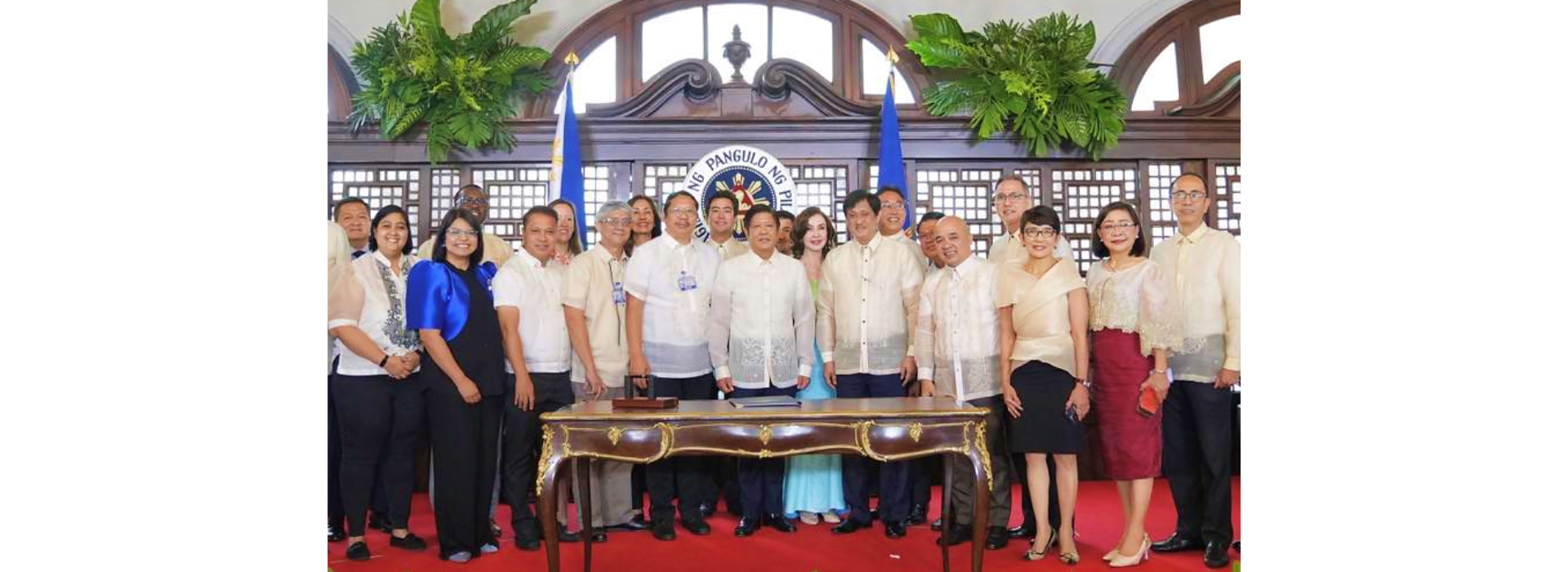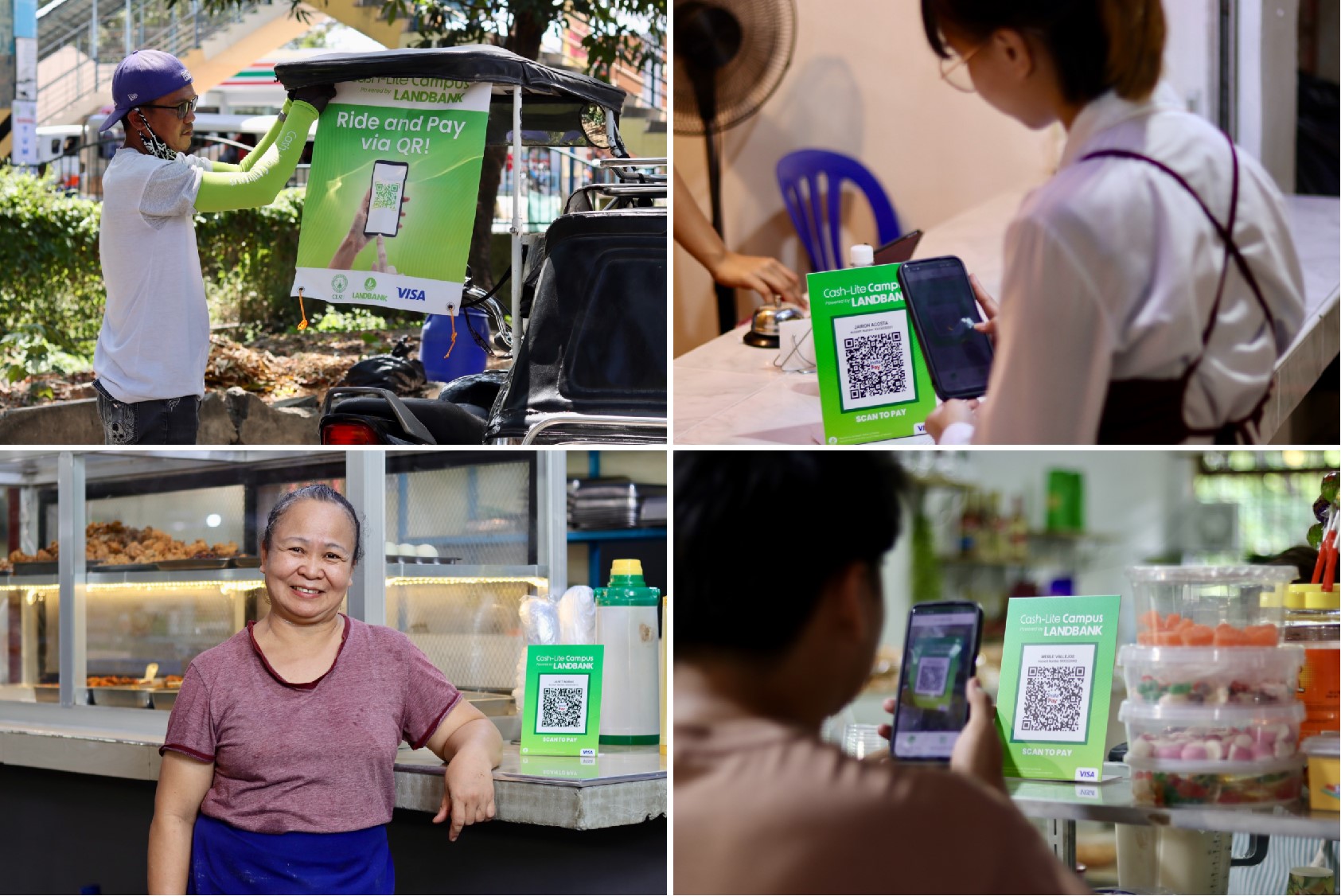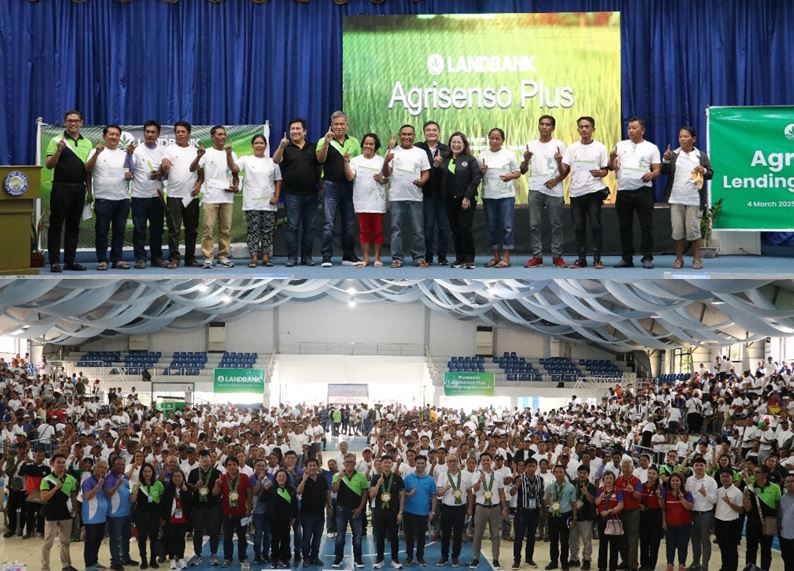
President Ferdinand R. Marcos, Jr. (center) signs into law the New Agrarian Emancipation Act on July 7, 2023, with Agrarian Reform Secretary and LANDBANK Board Member Conrado M. Estrella III (8th from right) and other DAR officials, together with LANDBANK President and CEO Lynette V. Ortiz (3rd from right), Executive Vice President Alex A. Lorayes (4th from right), and Vice President Atty. Marife Lynn O. Pascua (2nd from right) witnessing the event. (photo courtesy of DAR).
The Land Bank of the Philippines (LANDBANK) ensures that it will be working closely with government partners for the seamless and immediate implementation of the new law that frees agrarian reform beneficiaries (ARBs) nationwide from agrarian debts, in line with efforts to boost and modernize the agriculture sector.
The National Government is writing-off land amortizations managed by LANDBANK amounting to P57.74 billion as of 30 June 2023—effectively relieving over 649,000 ARBs tilling 1.17 million hectares of land debt.
The condonation is part of the landmark Republic Act No. 11953 or the New Agrarian Emancipation Act signed by Philippine President Ferdinand R. Marcos, Jr. on 7 July 2023.
Of the P57.74 billion, the National Government will condone outright P14.56 billion in principal loans of over 263,000 ARBs upon the effectivity of the law.
The Department of Agrarian Reform (DAR), in coordination with LANDBANK, will also expedite the processing of the remaining P43.17 billion principal loans of over 385,000 ARBs.
“We are proud to be part of this landmark initiative of the Marcos Administration to free farmers from debt and help them start anew. LANDBANK will likewise continue to pour investments and extend support initiatives for farmers nationwide to boost their productivity and income,” said LANDBANK President and CEO Lynette V. Ortiz.
The New Agrarian Emancipation Act condones all loans, including interests, penalties, and surcharges incurred by ARBs from land awarded to them under Presidential Decree 27 (Tenant Emancipation Decree issued in 1972), Republic Act No. 6657 (Comprehensive Agrarian Reform Law of 1988), and Republic Act No. 9700 (An Act strengthening the CARP and extending the acquisition and distribution of agricultural lands, issued in 2009).
The DAR will issue the implementing rules and regulations of the new law, in coordination with the Presidential Agrarian Reform Council Executive Committee (PARC ExCom) and with the technical expertise of LANDBANK, within 60 days from the issuance of the Act.
For his part, Agrarian Reform Secretary and LANDBANK Board Member Conrado M. Estrella III lauded Congress for the immediate passage of the law, and expressed gratitude to LANDBANK for its consistent support to ARBs over the years.
“Nagpapasalamat din po kami sa mga taga-LANDBANK sapagkat sila po ay very active na nagbibigay po ng credit assistance sa ating mga ARBs,” he said.
LANDBANK has extended P2.7 billion in loans to 2,356 individual ARBs and 469 ARB cooperatives and farmers’ associations nationwide.
Apart from credit assistance, LANDBANK also provides financial literacy and capability-building seminars to make sure borrowers are equipped with basic financial knowledge to manage their finances and boost their income.

Advancing digital financial inclusion: LANDBANK empowers campus ecosystem with cash-lite drive
SCIENCE CITY OF MUNOZ, Nueva Ecija – LANDBANK is partnering with the Central Luzon State University (CLSU) to provide a more secure, efficient, and convenient way to manage daily financial transactions through a cash-lite campus ecosystem. The state-run Bank launched the Cash-Lite Campus initiative on April 8, 2025, which aims to transform CLSU into a tech-savvy campus by integrating digital payment solutions for students, faculty, and staff in transacting with the university, including business centers, food carts, merchants, ambulant vendors, and University Transport Service (UTS) drivers operating within CLSU’s immediate vicinity. “We are excited to partner with CLSU in advancing digital transformation through the Cash-Lite Campus initiative. By offering secure and efficient cashless payment solutions, we are equipping students with the financial tools they need, while nurturing a digitally empowered academic community,” said LANDBANK President and CEO Lynette V. Ortiz. By leveraging the LANDBANK Mobile Banking App (MBA) and other e-payment channels, the program equipped students with essential digital financial skills that will reduce cash dependency and streamline transactions within the campus. LANDBANK also introduced students to the LANDBANK Piso Plus, which can be opened through a seamless, straight-through account opening process via the LANDBANK MBA, with no initial deposit, and no maintaining balance required. The launch event also featured a financial literacy session for CLSU students, and live demonstrations of online account opening via the LANDBANK MBA and cashless payment solutions via QR Code to showcase how the academic community can seamlessly transact using the Bank’s digital banking services. The initiative is expected to drive a significant increase in digital transactions and facilitate the opening of more than 8,000 new accounts. The event was led by CLSU President Dr. Evaristo A. Abella, CLSU Vice President for Business Affairs Dr. Karenina B. Romualdo, LANDBANK Executive Vice Presidents Liduvino S. Geron and Leila C. Martin, alongside key university officials and stakeholders. Following the successful launch at CLSU, LANDBANK is set to roll out the Cash-Lite Campus initiative at the Nueva Vizcaya State University (NVSU) and to more colleges and universities nationwide, further strengthening its efforts to drive digital adoption and financial inclusion in higher education institutions. Last month, LANDBANK successfully introduced the Cash-lite economy in Basco, Batanes to integrate digital payment solutions for the entire province, allowing both locals and visitors to enjoy safe, efficient, and hassle-free transactions across the province using LANDBANK’s mobile and electronic payment services, while reducing reliance on physical cash. ABOUT LANDBANK LANDBANK is the largest development financial institution in the country promoting financial inclusion, digital transformation, and sustainable national development. Present in all 82 provinces in the county, the Bank is committed to provide accessible and responsive financial solutions to empower Filipinos from countryside to countrywide.
LEARN MORE
LANDBANK AGRISENSO Plus fuels growth for Isabela farmers
ILAGAN CITY, Isabela – For farmer Gilbert Pacis, securing capital for the yellow corn cropping season was a constant struggle. Today, with LANDBANK’s AGRISENSO Plus Lending Program, that burden is lifting. “Dahil dito, hindi na kami mamomroblema sa puhunan. Nabibigyan ako ng lakas ng loob ng AGRISENSO Plus na magtanim ulit,” said Pacis, reflecting the optimism shared by over 1,300 farmers who gathered at the Ilagan City Community Center on 04 March 2025, as LANDBANK launched its financing initiative in this province. Aimed at providing accessible and affordable credit, the LANDBANK AGRISENSO Plus Lending Program empowers local farmers to sustain and expand their operations. The Program launch saw a turnout of 1,304 farmers, with over 500 farmers initiating loan applications. LANDBANK likewise facilitated ATM card applications on-site to integrate more farmers into the formal banking system. It is expected that an additional 400 loan applications will be received from farmers who are still completing the requirements. Strengthening partnerships for agricultural growth The event gathered key stakeholders, including Ilagan City Mayor Hon. Josemarie L. Diaz, LANDBANK Northern Luzon Lending Group Head First Vice President Eduardo N. Reyes, Northern Isabela Lending Center Head Myra Myrtha M. Padolina, and Ilagan Branch Head Roldan E. Acera. Also present were SAGITTARIAN Agricultural Philippines, Inc. President and CEO Jose Avelino C. Diaz, among other local partners. Additionally, Philippine Crop Insurance Corporation (PCIC) Insurance Processor Rostom M. Molina discussed PCIC's insurance services, while Engr. Roquito L. Cabras of the LANDBANK Countryside Development Foundation, Inc. (LCDFI) led a session on Digital Financial Literacy—further reinforcing LANDBANK’s holistic support for farmers and agri-entrepreneurs. As Isabela gears up for the upcoming yellow corn cropping season, LANDBANK is ramping up efforts to support even more farmers, ensuring they have the necessary resources to thrive.With AGRISENSO Plus and ASCEND Programs, LANDBANK remains steadfast in its mission to empower farmers, helping them achieve sustainable growth and financial stability. Empowering farmers through AGRISENSO Plus The LANDBANK AGRISENSO Plus Lending Programprovides smallholder farmers, fishers and agri-entrepreneurs with accessible and affordable credit. Offering flexible loan terms and competitive interest rates, the Program is tailored to address the unique financial needs of the whole agricultural value chain. The capacity-buildingcomponent of AGRISENSO Plus—the ASCEND Program—aims to enhance financial literacy and entrepreneurial skills among farmers and fishers. ASCEND provides training on modern farming techniques, financial management, and market access, empowering farmers and fishers to improve productivity and profitability. ABOUT LANDBANK LANDBANK is the largest development financial institution in the country promoting financial inclusion, digital transformation, and sustainable national development. Present in all 82 provinces in the county, the Bank is committed to provide accessible and responsive financial solutions to empower Filipinos from countryside to countrywide.
LEARN MORE
Boosting leasing and financial services: LLFC-ULFC merger complete with SEC approval
Following the merger of LANDBANK and UCPB in 2022, the Securities and Exchange Commission (SEC) has recently approved the merger of LBP Leasing and Finance Corporation (LLFC) and UCPB Leasing and Finance Corporation (ULFC). LANDBANK President Lynette V. Ortiz (6th from left), LLFC President and CEO Michael P. Arañas (5th from left), and ULFC OIC Kristine Marie G. Cuevas (center), lead the turnover ceremony on 28 March 2025 at LANDBANK Plaza in Manila. The Securities and Exchange Commission (SEC) has approved the documents governing the merger between LANDBANK subsidiaries—LANDBANK Leasing and Finance Corporation (LLFC) and UCPB Leasing and Finance Corporation (ULFC) on February 27, 2025—officially completing the consolidation, with LLFC as the sole surviving entity. The operational turnover and transition activities immediately followed the SEC approval. The integration is in accordance with Executive Order (EO) 65 signed by President Ferdinand R. Marcos Jr. on 6 August 2024, which authorized the merger, as it eliminates unnecessary overlap in mandates and functions. The merger follows the 2022 integration of the United Coconut Planters Bank (UCPB) into LANDBANK, which brought ULFC under LANDBANK’s umbrella. "This merger is a strategic step towards strengthening our leasing and finance operations, ensuring greater efficiency and financial capability to support key sectors. By consolidating LLFC and ULFC into a single entity, we are optimizing resources, expanding market reach, and bolstering our contribution to the government's inclusive growth agenda," said LANDBANK President and CEO Lynette V. Ortiz. The consolidation aligns with the government's broader effort of strengthening state-owned financial institutions by enhancing their capital base and operational efficiency. It positions LLFC to scale up support for agriculture, infrastructure development, and small and medium enterprises (SMEs), aligning with LANDBANK’s mission of advancing inclusive and sustainable growth. LANDBANK assures all clients of LLFC and ULFC that the merger process was designed for a smooth and orderly transition, ensuring uninterrupted customer service. With this merger, LANDBANK expands its financial services and reinforces its role in driving national economic development. ABOUT LANDBANK LANDBANK is the largest development financial institution in the country promoting financial inclusion, digital transformation, and sustainable national development. Present in all 82 provinces in the county, the Bank is committed to provide accessible and responsive financial solutions to empower Filipinos from countryside to countrywide.
LEARN MORE